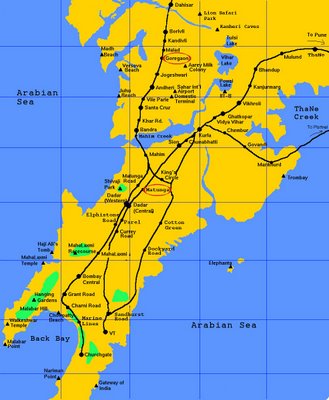
Mumbai, India (AP) - Seven explosions ripped through packed commuter trains during rush hour Tuesday in India's commercial capital, killing more than 100 people and injuring 300 in what officials said was a well-coordinated bomb attack by terrorists.
India's major cities were put on high alert after the blasts, which appeared timed to impose maximum carnage on the bustling city of 16 million. Its crowded rail network was thrown into chaos by the blasts and authorities were struggling to determine the impact.
Mumbai Police Chief A.N. Roy said on Indian television that 100 people were feared killed and more than 300 were injured.
"We are busy in the rescue operation. Our first priority is to rescue the injured people,'' he said. However, heavy monsoon downpours were hampering the effort.
The Press Trust of India news agency, citing officials, said at least 137 people were killed.
Indian Prime Minister Manmohan Singh called an emergency Cabinet meeting, and said that "terrorists'' were behind the attacks. Home Minister Shivraj Patil told reporters that authorities had "some'' information an attack was coming, "but place and time was not known.''
Vilasrao Deshmukh, the chief minister of Maharashtra state, where Mumbai is located, said bombs had caused the blasts. He said the death toll had reached 105.
"The official information is that these are bomb explosions,'' the minister said.
Police were also reportedly carrying out raids across the country following the explosions, presumably in search of suspects. One television report said a suspect was in custody.
A senior Mumbai police official, P.S. Pasricha, said the explosions were part of a well-coordinated attack.
Witnesses reported seeing body parts strewn about stations, and Indian television news channels broadcast footage of bystanders carrying victims to ambulances and searching through the wreckage for survivors and bodies. Some of the injured were seen frantically dialing their cell phones.
The force of the blasts ripped doors and windows off carriages, and luggage and debris were strewn about, splattered with blood. Survivors were seen clutching bloody bandages to their heads and faces. Some were able to get up and walk from the stations.
Pranay Prabhakar, the spokesman for the Western Railway, confirmed that seven blasts had taken place. He said all trains had been suspended in Mumbai, and he appealed to the public to stay away from the train stations in Mumbai, India's financial and commercial center and principal port on the Arabian sea.
Indian stock markets could plunge Wednesday if nervous investors dump shares following the blasts.
"Terror attacks like these could negatively swing the risk profile of India. Investors, sitting on the sidelines, would definitely rethink to put in money,'' said Trideep Bhattacharya, Asia head of technology research at UBS Securities.
The bomb blasts occurred after the stock markets ended. The financial capital suffered similar serial blasts in 1993 that included the Mumbai Stock Exchange, killing more than 250 people.
There was no immediate claim of responsibility for Tuesday's attacks, but the blasts came in quick succession _ a common tactic employed by Kashmiri militants that have repeatedly targeted India's cities.
The first explosion hit the train at a railway station in the northwestern suburb of Khar, said a police officer who spoke on the condition of anonymity because he was not authorized to talk to the media.
India's CNN-IBN television news, which had a reporter traveling on the train, said the blast took place in a first-class car as the train was moving, ripping through the compartment and killing more than a dozen people.
Roy, the Mumbai police chief, said the other blasts targeted trains, railway tracks and platforms. One explosion occurred near an underground subway station.
The purported attacks came hours after a series of grenade attacks by Islamic extremists that killed eight people in the main city of India's part of Kashmir.
Dozens of militant groups have been fighting Indian rule in Kashmir, demanding the mostly Muslim region's independence, or its merger with Pakistan. India accuses Pakistan of aiding the militants, who run training camps on Pakistan's of Kashmir. Pakistan denies the charge.
India and Pakistan have fought three wars since the subcontinent was partitioned upon independence from Britain in 1947, two over Kashmir.
Accusations of Pakistani involvement in a 2001 attack on India's parliament put the nuclear-armed rivals on the brink of a fourth war. But since then, Pakistan and India embarked on a peace process aimed at resolving their differences, including their conflicting claims to all of Jammu-Kashmir.
The Pakistani Foreign Ministry issued a statement late Tuesday condemning the attacks.
"Pakistan strongly condemns the series of bomb blasts on commuter trains,'' the ministry said in a statement. President Gen. Pervez Musharraf and Prime Minister Shaukat offered condolences over the loss of life, the statement said, adding "terrorism is a bane of our times and it must be condemned, rejected and countered effectively and comprehensively.''
In Washington, two U.S. officials, who spoke on condition of anonymity while events were unfolding, said it was too early to know for certain what group was behind the attacks. But both officials said they were likely part of the sectarian violence over Kashmir.
One of the officials said the attacks' coordinated nature and their targeting of trains at peak travel times match the modus operandi of two Islamic extremist groups that have been active in India during the last several years: Lashkar-e-Tayyaba, or Army of the Righteous, and Jaish-e-Mohammad, or Army of Mohammed.
The U.S. government has designated both groups as terrorist organizations and considers them affiliates of al-Qaida. Meanwhile, the U.S. State Department said it had no information about whether there were any American casualties. - AP
